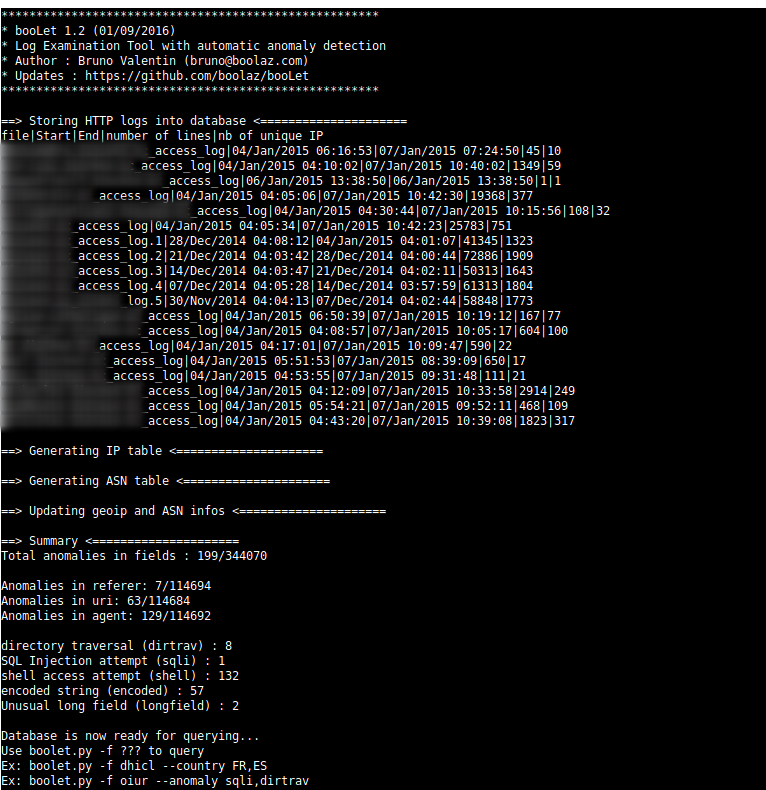____ _ _
| _ \ | | | |
| |_) | ___ ___ | | ___| |_
| _ < / _ \ / _ \| | / _ \ __|
| |_) | (_) | (_) | |___| __/ |_
|____/ \___/ \___/|______\___|\__|
The latest version is BooLET 1.2 (initially published on 10/10/2016). See Changelog for release notes.
This tool is aimed at optimizing analysis of HTTP logs and finding anomalies in the raw logs in an automated manner, based upon a custom set of Yara rules (SQLi, XSS, directory traversal, shells and PHP shells ...). booLet has the ability to also generate reports and exports based on filters applied to the raw logs.
booLet may be used by forensic investigators, or sysadmins to quickly review HTTP logs and determine the causes of incidents.
For a demo video, click on the picture above
Boolet 1.2 has been developed in python 2.7 and successfully tested on Linux Ubuntu 14.04 LTS (version 1.1 also works on MacOSX 10.11.6 El Capitan and Windows 8.1x64)
Boolet 1.2 requires four additional python modules to work
- geoip2 (2.2.0)
- pyasn (1.5.0b6)
- yara-python (3.5.0)
- PyYAML (3.12)
Installing the required modules can be achieved by the following commands :
sudo -H pip install geoip2
sudo -H pip install pyasn
sudo -H pip install pyYAML
sudo -H pip install yara-python
booLet 1.2 is not currently available for those operating systems. A compatible version will be online soon. For the time being, Windows and mac users may use booLet 1.1 instead but won't benefit from automatic anomaly detection.
Once you have all modules properly installed, you can import your raw logs.
$ booLet.py --import combined access.*
For now, booLet supports three formats of logs : combined, common, and iponly (one IP per line)
The previous command will create a SQLite database, parse your logs, and populate the database with the data. It will also generate a CSV file containing the summary of the imported log files (start, end, nb of lines, nb of unique IP)
During this phase, boolet ignores the following types of file : ico jpg png js css gif woff svg robots.txt to focus more on static HTML pages and dynamic content such as PHP scripts.
In addition, Boolet ignores visits from most common bots as they are generally not of interest in the scope of a forensic investigation.
==> Storing HTTP logs into database <=====================
file|Start|End|number of lines|nb of unique IP
www.brunovalentin.com.log|03/Jul/2016 06:37:04|06/Jul/2016 20:07:21|14161|906
www.brunovalentin.com.log.1|26/Jun/2016 06:53:16|03/Jul/2016 06:36:23|29494|1685
==> Generating IP table <=====================
==> Generating ASN table <=====================
==> Updating geoip and ASN infos <=====================
==> Summary <=====================
Total anomalies in fields : 199/344070
Anomalies in referer: 7/114694
Anomalies in uri: 63/114684
Anomalies in agent: 129/114692
directory traversal (dirtrav) : 8
SQL Injection attempt (sqli) : 1
shell access attempt (shell) : 132
encoded string (encoded) : 57
Unusual long field (longfield) : 2
You are now ready to submit your requests to the database.
Each and every line of log is now associated with additional fields regarding IP addresses (country name, country ISO code, city, Autonomous System (ASN), ASN description, and IP range the IP address belongs to)
you can retrieve your log data based upon selected fields in the requested order
example
$ booLet.py --fields dhicu
will give you the following result
...
2016-07-06|19:58:29|194.187.170.111|FR|/page/2/
2016-07-06|19:58:32|194.187.170.111|FR|/a-propos/
2016-07-06|19:58:37|194.187.170.111|FR|/dev/boofadet/
2016-07-06|19:59:49|208.78.55.117|MF|/mac/clavier-mac-francais-windows/
2016-07-06|19:59:55|194.187.170.111|FR|/category/trucs-de-geek/
...
The following fields may be used :
i: ip
d: date
h: time
m: method
u: url
t: http status code
z: size
r: referer
a: agent
c: country code
n: country name
y: city
s: asn
g: asn range
l: asn label
o: type of anomaly detected
If you want to narrow down your search and to be presented with more accurate information, you can also filter data upon specific fields
This example displays fields dhiuns where country code=(BE or ES or DE) and time begins with "16:"
$ booLet12.py --fields dhiuns --country BE,ES,DE --time 16:
output :
2016-06-28|16:27:10|136.243.56.239|/feed/|Germany|AS24940
2016-06-28|16:27:10|136.243.56.239|/feed/|Germany|AS24940
2016-06-29|16:08:24|85.26.90.2|/|Belgium|AS12392
2016-06-29|16:10:11|85.26.90.2|/investigation-numerique/encase-forensic-8-fin-juin/|Belgium|AS12392
2016-06-29|16:10:13|85.26.90.2|/investigation-numerique/effacement-chimique-disque-dur/|Belgium|AS12392
2016-06-29|16:11:21|85.26.90.2|/page/2/|Belgium|AS12392
2016-06-29|16:11:22|85.26.90.2|/ul/monitorssetup-1024x669.jpeg|Belgium|AS12392
2016-06-29|16:13:18|85.26.90.2|/sans-categorie/des-machines-virtuelles-oui-mes-des-ecrans-cest-mieux/|Belgium|AS12392
2016-06-29|16:13:19|85.26.90.2|/securite-info/rechercher-traces-meterpreter-en-memoire-volatility/|Belgium|AS12392
2016-06-29|16:24:54|136.243.56.239|/feed/|Germany|AS24940
2016-06-30|16:27:31|136.243.56.239|/feed/|Germany|AS24940
2016-07-06|16:30:29|109.128.211.78|/|Belgium|AS5432
Of course you're free to chose the fields order : dhiuns is not idhsnu
You can also search for lines with anomalies
Ex: boolet12.py -f oiur --anomaly sqli,dirtrav
Ex: boolet12.py -f oiur --anomaly all
The following example will retrieve only SQL Injections,SQL file downloads and directory traversals and will display the following fields (odhiu : anomaly, date, time, ip, uri)
booLet12.py -f odhiu --anomaly sqlfile,sqli,dirtrav
The result will be as following :
sqlfile|2014-12-07|04:24:49|46.161.41.257|/Agenda.sql
encoded,shell,sqli|2014-12-10|17:21:19|61.182.202.257|/insert+into%3A%2C%45%56%76%54%4E%3A%2E%45
dirtrav|2014-12-03|10:10:22|74.208.69.198|/vtigercrm/modules/com_vtiger_workflow/sortfieldsjson.php?module_name=../../../../../../../..//etc/asterisk/sip_additional.conf%00
dirtrav|2014-12-18|21:34:49|202.62.155.257|/cart.php?a=byroe&templatefile=../../../configuration.php%00
dirtrav|2014-12-23|20:43:49|192.99.68.257|/?lang=../../../../../../../../../../../proc/self/environ
dirtrav|2014-12-23|20:46:04|192.99.68.257|/?lang=../../../../../../../../../../../proc/self/environ%00
dirtrav|2015-01-04|23:56:34|82.97.16.257|//cgi-bin/webcm?getpage=../html/menus/menu2.html&var:lang=%26%20allcfgconv%20-C%20voip%20-c%20-o%20-%20../../../../../var/tmp/voip.cfg%20%26
dirtrav|2015-01-05|02:19:43|82.97.16.257|//cgi-bin/webcm?getpage=../html/menus/menu2.html&var:lang=%26%20allcfgconv%20-C%20voip%20-c%20-o%20-%20../../../../../var/tmp/voip.cfg%20%26
dirtrav|2015-01-05|02:55:11|82.97.16.257|//cgi-bin/webcm?getpage=../html/menus/menu2.html&var:lang=%26%20allcfgconv%20-C%20voip%20-c%20-o%20-%20../../../../../var/tmp/voip.cfg%20%26
dirtrav|2015-01-07|00:10:00|216.121.118.257|/index.php?page=../../../../../../../../../../../proc/self/environ
use the --help option of boolet for more options
When you're happy with your output, you have two options to save it to an output file.
-
Use the > sign to redirect to a new file
$ booLet.py --fields dhi > outfile.csv -
Boolet has also a
--outoption to export in a csv file (pipe separated fields)$ booLet.py --fields dhi --out outfile.csv
Both will generate the following file, named outfile.csv :
2016-06-26|06:54:10|146.185.251.48
2016-06-26|06:57:39|146.185.251.210
2016-06-26|07:00:09|94.228.34.250
2016-06-26|07:00:21|146.185.251.48
2016-06-26|07:00:35|37.187.109.125
2016-06-26|07:00:36|91.134.167.121
2016-06-26|07:01:04|86.247.45.90
...
This format has been adopted because it is as easy to read as to process with bash tools like awk, cut or sort.
- update functionality for geoip and asn databases
- add more input formats
Stay tuned for updates and please, feel free to report any bug to the author.
